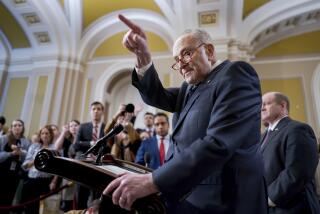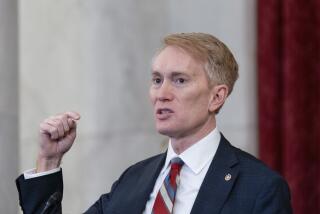U.S. Opposes Plan for Kurdish Haven in Iraq : Refugees: The Administration contends that allies already have all the authority needed to provide aid.
- Share via
WASHINGTON — In its first break with the British government over tactics in the Persian Gulf, the Bush Administration said Tuesday that Prime Minister John Major’s plan for a Kurdish haven in northern Iraq appears unnecessary and might even interfere with efforts to feed and protect refugees from Saddam Hussein’s oppression.
A senior Administration official said that Washington is not unsympathetic to Major’s objectives but that the United States and its allies already have ample authority from the U.N. Security Council to protect Iraqi refugees. “Our emphasis is on getting the job done,” the official said.
Major’s proposal, which has been endorsed by the 12-nation European Community, would require a new vote by the Security Council. It could face a veto from either the Soviet Union or China, neither of which would welcome the precedent of U.N. interference with government repression of political dissidents or ethnic separatists.
“We don’t want to go back to the U.N.,” the official said.
U.N. Secretary General Javier Perez de Cuellar said that it is doubtful that the Security Council would be willing to create a Kurdish enclave in Iraq. He told reporters that there is “always the problem of interference in the internal affairs of member countries.”
State Department spokesman Richard Boucher said that Security Council Resolution 688, adopted Friday, already authorizes member states to provide relief supplies to refugees in camps straddling Iraq’s borders with Turkey and Iran. A U.S.-led airlift began during the weekend.
“Any interference with the . . . airdrops, with the relief effort, would not be permitted,” Boucher said. He added that the resolution makes it clear that the Iraqi army will not be allowed to interfere with refugees who have reached the border area.
It was not immediately clear, however, how the United States and its allies could protect the Kurds and other refugees. Although the U.S.-led coalition shredded the Iraqi army during the Persian Gulf War, President Bush has said he is unwilling to use military force to intervene in Iraq’s civil war.
Even so, U.S. officials said that an Iraqi attack on refugee camps--regardless of whether they are in Iraq, Turkey or Iran--would be treated as a far more serious matter than Iraqi military action against armed insurgents. One official said that the Administration definitely would take action if Iraq interferes with relief efforts.
White House Press Secretary Marlin Fitzwater said that the U.S. Air Force will continue to fly reconnaissance missions and combat air patrols over Iraq. Although he did not tie the flights to the Kurdish refugee situation, the continuing air activity would permit the United States to resume offensive operations quickly.
Administration officials said they were taken by surprise when Major presented his plan to a European summit meeting Monday in Luxembourg. Both Major and Bush have faced increasing criticism for standing by idly while the Iraqi military slaughtered Kurds in the northern part of the country and Shiite Muslim rebels in the south.
“To do this, you need some kind of force,” said a U.S. official. “It could be a civil force unarmed, or it could be a military force armed. But you’re talking about invading Iraq.
“Think of the implications,” he continued. “Let’s say there are riots in Armenia and Georgia. Then the Red Army comes in and puts them down. Is that genocide? Does the U.N. come in and put up safe havens in Armenia and Georgia? And whose force are they talking about? Ours?”
Fitzwater said that 18 airdrop missions were flown Sunday and Monday, delivering more than 172,000 pounds of supplies to Kurdish refugees.
Meanwhile, Perez de Cuellar named Prince Sadruddin Aga Khan to oversee all U.N. humanitarian aid programs in Iraq and Kuwait. Sadruddin, 58, a former U.N. high commissioner for refugees, will be based in Geneva.
More to Read
Sign up for Essential California
The most important California stories and recommendations in your inbox every morning.
You may occasionally receive promotional content from the Los Angeles Times.













